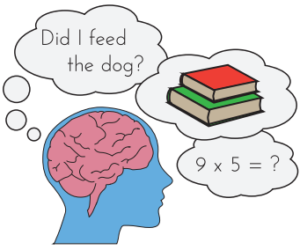Fact Sheet
How Does Exercise Affect Your Brain (Grades 6-8)
Who this is for:

Regular physical activity is an important part of a healthy lifestyle. Not only is exercise good for your muscles and bones, but it is also an important part of keeping your brain healthy too.
What counts as “regular exercise?”
According to experts, the recommended amount of exercise to keep your mind sharp is about an hour a day. One of the best ways to get exercise is to play sports. Being on a team can build self-confidence, and regular practice schedules are good for your health. If you don’t like sports or competition, that’s OK too! Exercise doesn’t only mean playing sports, it just means moving your body and being active. A few other examples of exercise are: dancing, walking, biking, swimming, or throwing a Frisbee.
What is happening in the body and brain during exercise?
As your heart rate increases during exercise, blood flow to the brain increases. As blood flow increases, your brain is exposed to more oxygen and nutrients. Exercise also induces the release of beneficial proteins in the brain. These nourishing proteins keep brain cells (also known as neurons) healthy, and promote the growth of new neurons. Neurons are the working building blocks of the brain. As a result, individual neuron health is important to overall brain health.
Exercise boosts your mood and reduces stress
When you exercise, your body releases chemicals such as dopamine (pronounced doh-pa-meen) and endorphins (en-door-fins) in your brain that make you feel happy. Not only is your brain dumping out feel-good chemicals, but exercise also helps your brain get rid of chemicals that make you feel stressed and anxious. People who exercise tend to be happier and less stressed than those who don’t exercise. Regular exercise can also help you control your emotions when you do feel angry or upset.
Exercise may improve your grades
That’s right! Exercise has been shown to improve mental abilities. On average, children and young adults who exercise tend to have better test scores in math and reading when compared to those who don’t. There are a number of mental abilities that are improved with regular exercise:

Physical activity can improve your long-term and short-term memory. Children and young adults who were asked to exercise just a few times a week showed big improvements in their ability to remember what they read.

Being active gives you more energy during the day and helps you sleep better at night. In turn, better sleep improves creativity and brain function.

Being active gives you more energy during the day and helps you sleep better at night. In turn, better sleep improves creativity and brain function.
Exercise is especially important for kids and young adults
As you can see, there are lots of benefits to being active. Creating healthy exercise habits when you’re young makes it easier to maintain those routines as you grow older. Consistent exercise through childhood and adulthood keeps brains healthy. Increasing evidence suggests that staying active as an adult can even lower your risk of dementia in old age. It’s never too late to start exercising and keep your brain in tiptop shape!